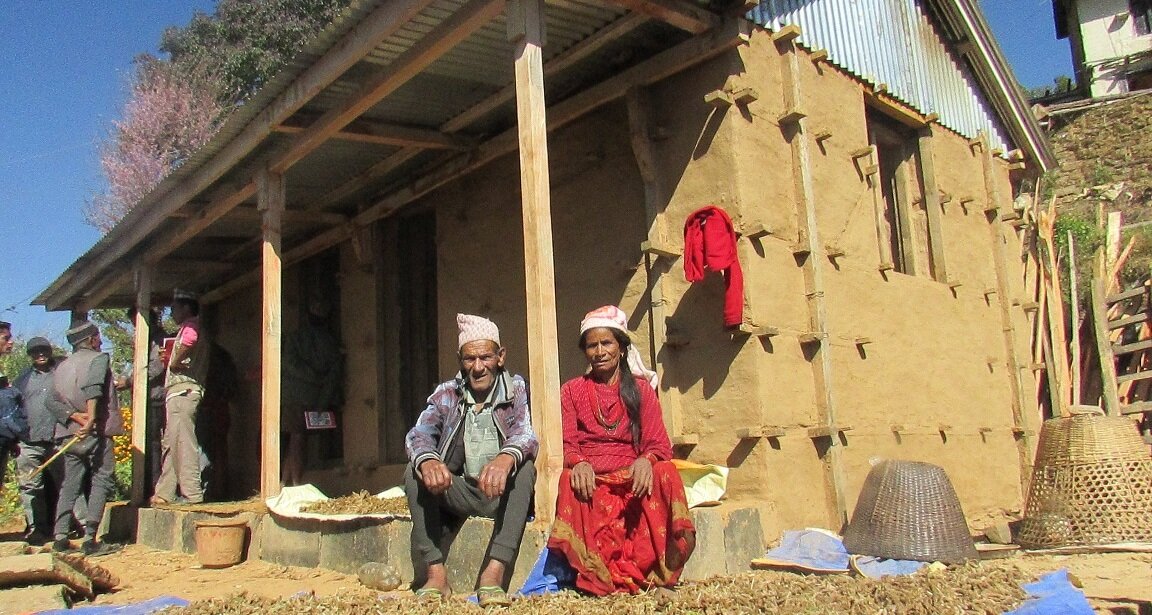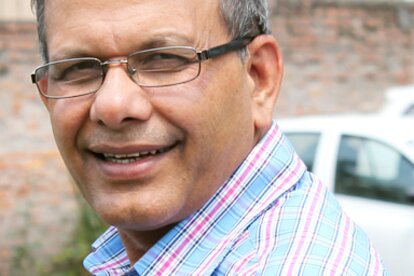Today, Saturday 25 April, marks the fifth anniversary (in the Gregorian calendar) of the earthquake that devastated central Nepal. It also marks a month of country-wide Covid-19 confinement following the government’s declaration of lockdown on 24 March 2020. Two very different emergency situations – but two with certain commonalities.
Self-preservation
As they always instruct on flights: “if the oxygen supply fails, put on your own mask before attending to others”. Whether the danger is the earth shaking or an invisible pathogen, the first thing to do is to ensure one’s own safety and that of one’s family. Bharat remembers staying in his car during the first few days of the earthquake period, trying to get through on the phone to his wife, who was stranded outside the capital. Then it was unsafe to go indoors – now it is unsafe to go outdoors… Once telephone services were operating, it was quickly established that all Helvetas staff (some 250 at the time) were safe. By day three, whilst aftershocks continued, Bharat met with key staff members to plan the response. The procurement of relief supplies began, and soon Helvetas vehicles were moving to the worst affected areas outside Kathmandu with tarpaulins and other emergency supplies. No pressure was put on members of staff to go to the affected areas, but many volunteered and found consolation from personal distress in being able to help others.
In the current lockdown, our safety (for the time being) is assured. We meet regularly in virtual discussions, but we are worried about our work. Will the virus take hold? How are poor families managing this period of no income? What can we do about all the project activities that we had planned before the monsoon – how will we catch up? We are organizing what we can from a distance.
Dealing with trauma – psycho-social counselling
It seemed that nothing could be more traumatic than the earth moving beneath one’s feet – but in many ways, the COVID-19 threat is worse. Lockdown brings its own stresses, including a risk of increased domestic violence (already starting to be reported). There is so much uncertainty about the virus spread, how long confinement will last, what will happen afterwards… and so many false rumors flying in social media.
Psycho-social counselling is a very important service for many people in disaster situations; it deserves more recognition, with no stigma attached to those seeking help. We have discussed such support with counselling service providers, notably our partners in the Safer Migration (SaMi) project, a bilateral project of the Swiss Agency for Development and Cooperation, SDC and Government of Nepal. Whilst normally offering psycho-social counselling to returnee migrants and their families, these specialists are now providing virtual COVID-19 counselling - finding a huge demand for their services. As managers, we are encouraging our own staff to seek such support in case of need.
Disaster preparedness is needed at the local level
Out in rural areas, it was neighbors and local authorities who saved most lives after the earthquake; relief services took time to arrive. It was also the local authorities who knew best where relief supplies were needed once they were delivered - coordinating local distribution. This was before Nepal’s federalization. Now that the federal system of governance is in operation, it is municipalities that are legally responsible for disaster response activities within their territory whilst the provinces and federal government regulate the movement of people, and coordinate supplies overall. This is a new situation for everyone, but it underlines the need for disaster preparedness. From our close contacts on the ground, we understand that municipalities are responding as best they can, organizing quarantine camps for returnee laborers, setting up hand-washing stations, preparing health posts and clinics, and trying to source medical equipment such as face masks, thermo-guns and protective clothing. Those in the vicinity of Kathmandu are organizing transport for their citizens to return from the city to their homes – though whether this is wise, given that social distancing is impossible in the transport provided, is debatable. All this is being done on an ad hoc basis; municipalities have no figures on the number and location of their citizens living elsewhere. Data such as these, integrated into a disaster preparedness plan (officially, a Local Disaster and Climate Resilience Plan), is something that has been foreseen and is clearly urgently needed.
Emerging stronger and better?
The trauma and losses caused by the 2015 earthquake, including the deaths of some 9,000 individuals, are not forgotten. Nevertheless, the destruction provided an opportunity to “build back better” in the affected areas. Working with the people of Melamchi and Helambu municipalities, with support from Solidarity Swiss and other donors, we built earthquake-resilient homes, private drinking water taps instead of community taps, rehabilitated small irrigation schemes with reinforced and protected channels, constructed improved water mills, and ensured better water, sanitation and hygiene in schools (in collaboration with Caritas Swiss). In a bilateral project of the Swiss Agency for Cooperation and Development, SDC and Government of Nepal, Employment Fund Skills for Reconstruction, and also a similar DFID (UKAID) project, we trained men and women masons and carpenters in earthquake resilient construction techniques – equipping them with the skills not only to rebuild homes immediately, but to have lifelong employment in the construction industry. These are major transformations for good that have come out of a very dark situation.

COVID-19 is placing a spotlight on many weaknesses in health services, disaster preparedness, and in water, sanitation and hygiene (WASH) knowledge and facilities. We are rising to the challenge as far as possible in the current lockdown - and have already changed the way we operate in using communication technology. We are learning and adapting. We must hope that, like the earthquake, the current crisis will lead to innovations and improvements - with Nepal emerging stronger and better.



